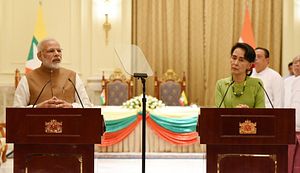Myanmar and Bangladesh have moved into the nitty-gritty of a repatriation agreement, yet the prospect of Rohingya refugees returning from Bangladesh to their homes in Myanmar’s Rakhine state remains elusive still. The existing anti-Rohingya sentiment, Myanmar’s verification criteria, and Rohingya concerns over resettlement will translate into only a few thousand returning to Mynamar. Most refugees might choose to stay in Bangladesh. Beyond that, the odds are high that a situation like that the bloody crackdown of August 2017 will arise again in the future.
India till now has managed to keep at arm’s length from the issue. Its policy is treading lightly with Myanmar, out of geopolitical and geoeconomic concerns. But, now that the situation appears to have settled down, India needs to look at the crisis in the eye.
A lack of economic opportunities and scant resources for the unprecedented numbers of refugees have been a stress on Bangladesh. Therefore, it cannot be ruled out that the future will see Rohingyas trickling into India. Given that, how does a do-nothing policy serve India’s interest?
India’s Do-Nothing Approach
Since independence, India has followed ad hoc policies when it comes to refugee settlement. A formal migration policy makes decision-making fast and consistent, yet it leaves little room for realpolitik. A do-nothing policy provides a safe spot, though it might come at the cost of realizing India’s leadership goals.
China’s example in this regard is instructive. Till now, Beijing has shied away from involving itself in the internal politics of another country. But in the Rohingya crisis, Beijing played a mediatory role between Myanmar and Bangladesh. Chinese media has been rather self-congratulatory on the issue.
With the Act East policy rolling, this sort of diplomatic posturing would have worked in India’s favor. Instead, India stayed tight-lipped. Worse, New Delhi threatened to deport the 40,000 Rohingyas living within its borders, citing national security concerns. The threat of deportation was cruel at best and hurt India’s international image at the worst. Even putting aside international refoulement law, no other country will readily accept the Rohingya, rendering a deportation policy defunct. India has no option but to let them stay. The entire exercise only attracted criticism from various quarters.
The government has stationed 6,000 soldiers on the India-Bangladesh border to keep a strict vigil against any Rohingya influx. It’s unclear how long these soldiers will be posted on the border. Any laxity will lead to illegal immigration. Ultimately, a do-nothing approach will result in more migration into India. This will cause local backlash, stress on resources, and clashes on regional and religious lines. An absence of data on Rohingya immigration will hamper India’s national security efforts as well.
To be fair, no links between the Rohingya in India and terror outfits have been established. No arms or ammunition were found on those apprehended. Yet they do remain vulnerable to recruitment by groups like the Islamic State and the Lashkar-e-Taiba. The head of al-Qaeda’s offshoot in Kashmir, Zakir Musa, has expressed solidarity with Rohingya living in Jammu. The Rohingya militant group Aqa Mul Mujahideen (AMM) allegedly has ties with groups such as the LeT and Jaish-e-Mohammed (JeM), and the 2013 explosions at the Buddhist Bodhgaya temple complex were alleged to have Rohingya links. Several Rohingya have been trafficked from India to Saudi Arabia as recruits for the Islamic State.
India’s Act East Policy and the Rohingya Crisis
For India, relationships with both Bangladesh and Myanmar are crucial. Mynamar is India’s gateway to Southeast Asia; this explains why India has soft-peddled on the Rohingya issue. India needs Myanmar for coordinating patrols of the southern Indian Ocean. Along with that, Rakhine state is a crucial link for India’s hydrocarbon and trade ambitions; India has been working on connecting northeast Indian states to Sittwe port.
However, truth be told, India has already lost to China in developing strategic and economic ties with Myanmar. New Delhi’s years of courting Myanmar have yielded only uncooked projects. India is still dealing with northeast insurgent camps, such as the National Socialist Council of Nagalim and United National Liberation Front of Manipur, operating from Kachin, Shan, and Chin states in Myanmar.
What is more crucial for India is the relationship with Bangladesh. India needs Bangladeshi territory for the movement of people as well as goods. The India-Bangladesh relationship under the present Sheikh Hasina government has been momentous. However, elections in Bangladesh are in corner and this series of positives achieved over the years could be upturned in case of a change in power. The opposition Bangladesh National Party has already started blaming the government for the Rohingya crisis. Thus India needs to play its cards well.
Bangladesh has stepped up to this human catastrophe, but food, medicine, and first aid are in short supply. Under Operation Insaniyat, India has been sending aid to Bangladesh; in total, 7,000 metric tonnes of relief aid will be moved through the operation. Hefty humanitarian assistance will definitely boost India’s image, but foreign policy cannot be run on soft power alone. It is important that the Rohingya in India be settled with the government’s assistance so as to reduce their vulnerability to radicalization and petty crime. Most importantly, India needs to get more involved in the long-term resolution of the crisis. Improving connectivity with Rakhine state and establishing commercial links with the entire region will play a larger role in stabilizing the region and that should be the focus of the Indian government at the moment.
Shreya Upadhyay is a program associate at Takshashila Institution, Bangalore. She has a PhD in International Studies from the Jawaharlal Nehru University, New Delhi and was a Fulbright scholar in 2015-16.

































